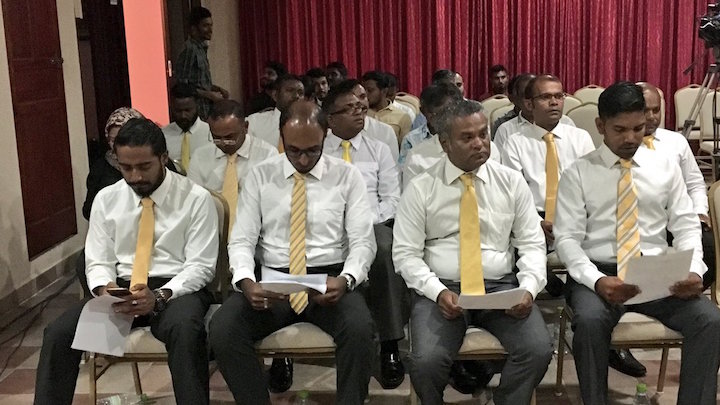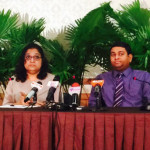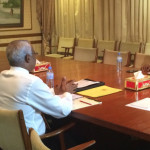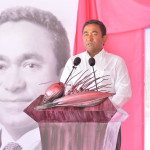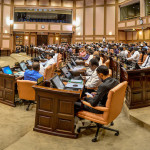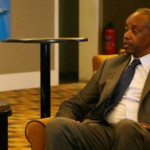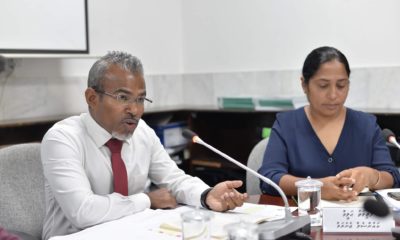The main opposition Maldivian Democratic Party’s national council decided Monday night to heed the Commonwealth’s call to engage in dialogue with the government to resolve a protracted political crisis.
A resolution proposed by MDP Vice President Mohamed Shifaz for the party’s leadership to assign representatives for the talks was passed with the support of 37 out of 39 council members in attendance.
The party previously refused to join talks before the release of its jailed leader, former President Mohamed Nasheed, citing the government refusal to honour commitments made during negotiations in July last year.
“This is not a step backwards,” said Shifaz. The MDP will seek the release of Nasheed and other jailed politicians during the talks, which he said should proceed with international mediators.
Shifaz and other council members who backed the resolution said President Abdulla Yameen was “forced” to initiate all-party talks due to foreign pressure brought on by the efforts of the united opposition.
The Commonwealth Ministerial Action Group placed the Maldives on its formal agenda last Friday over the lack of progress on six priority areas, including all-party talks.
The CMAG urged both the government and the opposition to initiate time-bound dialogue without preconditions “to achieve national agreement on institutional reform, and to ensure a conducive environment for credible and inclusive presidential elections in 2018.”
The MDP promptly welcomed the CMAG’s decision and called on the government “to immediately engage in political dialogue with all stakeholders”.
On Sunday, the government asked the MDP and its ally Adhaalath Party to send details of its representatives “as they were the only parties who have not yet done so despite several previous requests.”
Fisheries Minister Dr Mohamed Shainee, the government’s representative for all-party talks, said there is an “open invitation” for the talks and blamed the opposition’s precondition for the lack of progress.
During the debate at last night’s MDP council meeting, most members questioned the government’s sincerity but some suggested that concessions are now more likely with the government under pressure.
The CMAG had said that it would consider suspending the Maldives from the Councils of the Commonwealth if progress is not made by its next meeting in March 2017.
“The government would not want the talks. When the government calls for something it doesn’t want to do, we should do it. The government is in hot water now,” said MP Imthiyaz Fahmy.
But Anwar Ibrahim, one of the two dissenting members, said the decision to compromise is a “step backwards” as the party’s leadership is either in exile or facing the threat of arrest or prosecution.
“Our members do not want to join talks without President Nasheed,” he said.
Mohamed Waheed ‘Waddey’ – who was recently released after being detained with two other council members on charges of plotting to overthrow the government – said the MDP should continue to demand Nasheed’s release before sitting down for talks.
Shainee had previously said the government is willing to allow Nasheed and Adhaalath Party leader Sheikh Imran Abdulla to represent their parties.
But Nasheed must return to the Maldives, he said.
Imran, who is serving a 12-year jail sentence related to a terrorism charge over a speech he gave at a mass anti-government rally on May 1 last year, was transferred to house arrest ahead of the CMAG’s meeting in April.
The government has since revoked the passports of Nasheed and other exiled opposition leaders. The criminal court has also issued warrants for their arrest.
The opposition leader was granted asylum in the UK last May after he was authorised to travel for medical treatment.
In the UK, he teamed up with former top officials of Yameen’s administration to form a new alliance, the Maldives United Opposition.
A UN-sponsored effort to spur dialogue earlier this year meanwhile failed after proximity talks with a UN envoy.
A follow-up visit in July by Tamrat Samuel, a special advisor at the UN’s department of political affairs, ended with no meaningful sign of progress.
Nasheed, whose imprisonment on a terrorism charge in March last year triggered the ongoing political crisis, had said after Samuel’s visit that dialogue cannot take place with “political party leaders held as hostages.”
“Moving forward with political dialogue remains with President Yameen releasing prisoners and paving the way for talks between the Maldives United Opposition and the government to establish a dialogue for inclusive free and fair elections,” his office said at the time.
“This dialogue must address the release of political prisoners including Sheikh Imran, and produce tangible and actionable resolutions on judicial reform, and human rights in the Maldives.”

